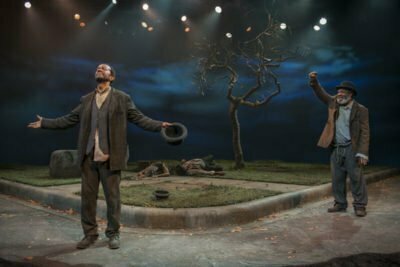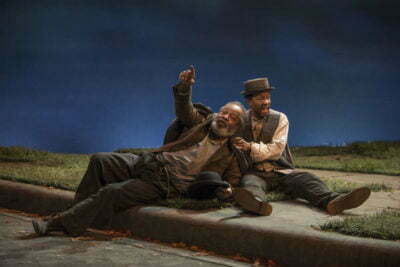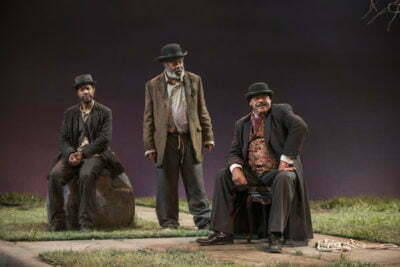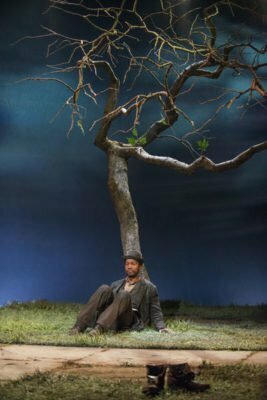Waiting for Godot

By Samuel Beckett
Directed by Ron OJ Parson
Produced by Court Theatre
Shall We Go? Yes, Let’s Go.
Waiting for Godot is one of the plays that provokes a reaction just by saying its title. Difficult, elusive, and easy to blunder with, few works evoke such a strong mixture of love and hate from everyone familiar with them. Even the title character’s name is frequently bungled; Beckett wanted it pronounced “GOD-o,” not the more common “guh-DO.” In case you’re wondering what all the fuss is about, or whether anyone really likes this work or is just pretending they do to seem smart, Court Theatre’s new production will demonstrate to you the genius of absurdism. Director Ron OJ Parson and his cast have waited for fifteen years to make their vision of this play reality, and have planned out every moment meticulously to leave their particular mark.
So what happens in Waiting for Godot? Vladimir/Didi (Allen Gilmore) and Estragon/Gogo (Alfred H. Wilson) find ways of amusing themselves while passing their lives under a tree. Scenic designer Courtney O’Neill has added sidewalks to the road on which they are waiting, but it’s the same situation as ever, and costume designer Nan Cibula-Jenkins has supplied them with their usual shabby attempts at respectable dress. Maybe the two friends would be better off if they left each other, but they care too much for each other to do that. Maybe they’d be better off if they hanged themselves, but then they might miss something, or leave the other alone forever. Eventually along comes Pozzo (A.C. Smith) and his leashed slave, Lucky (Anthony Lee Irons), who provide some amusing, yet disturbing diversion. A boy (Oscar Vasquez III/ Alex Henderson) runs in to say Mr. Godot won’t be along today, but definitely tomorrow. The next day follows a similar pattern, but is different in the specifics.
I cannot praise the actors enough. Allen Gilmore’s Didi is intellectual, sardonic, and moralistic, but wills himself to be joyous. Ironically, it is his need to question everything that prevents him from escaping fully into the games of his own creation, resulting in his keen pain. Alfred H. Wilson’s Gogo is gruff and crude, and often relies on wordless exclamations of frustration. They deeply care for each other, and their reunion at the beginning of the second act brought forth sympathetic murmurs from many in the audience. A.C. Smith’s Pozzo is a cruel whip-cracking narcissist, and yet you cannot help being drawn to him. In his way, he is as much a philosopher as Didi. Antony Lee Irons as Lucky seethes silently in hurt and betrayal. I think he’s young for the part, but he delivers his monologue well: like somebody whose thoughts race so far ahead of his ability to speak that he changes track mid-sentence in desperation to get out everything he has to say. All the actors have crisp, distinctive voices they use to give their characters a strong sense of history, and their physicality is raucous at times, displaying both their comedic talent and Parson’s understanding of Beckett’s vaudeville influence.
This was the first time while experiencing Godot that I appreciated Pozzo’s speech about the long wait for night. Lee Keenan’s light design is beautiful and melancholy. The day does indeed shift, but seemingly without end until it is dark all of a sudden. The first act is dramatic, but the second is so comedic I realized that Didi, Gogo, and Pozzo are merely playing an elaborate game to pass their limbo-like existence. Whether Lucky and the Boy are in on that game I am not sure, but Parson presented the play in a way that made sense to me. The trick in it is that even though the pacing drags at times, this feels like something the actors are gamely enduring with us, rather than causing. Parson’s use of the entire playing space, and Beckett’s own explicit references to the bathroom and stageboards in the dialogue, show these characters to be people with nothing better to do than imitate things and ramble about big themes until the lights go out. What else could you want from theatre?
Highly Recommended
Jacob Davis
Reviewed January 28, 2015
For more information, see Waiting for Godot’s page on Theatre in Chicago.
Playing at Court Theatre, 5535 South Ellis Avenue, Chicago. For tickets, call 773-753-4472 or visit www.CourtTheatre.org. Tickets are $45-65. Plays Wednesdays and Thursdays at 7:30 pm, Fridays at 8:00 pm, Saturdays at 3:00 and 8:00 pm, and Sundays at 2:30 pm and 7:30 pm through February 15. Running time is two hours and forty-five minutes with one intermission. through February 15, 2015



